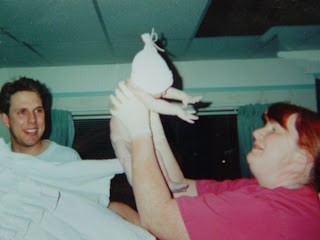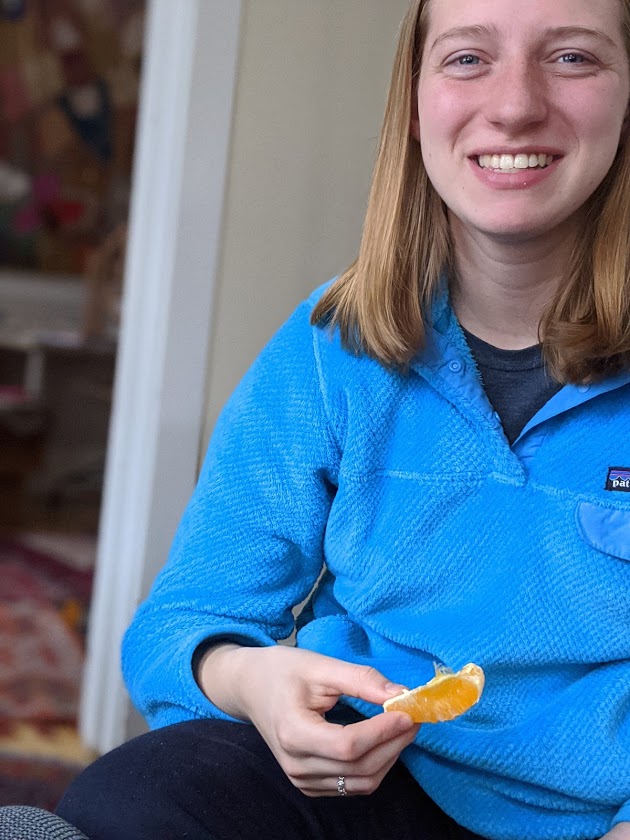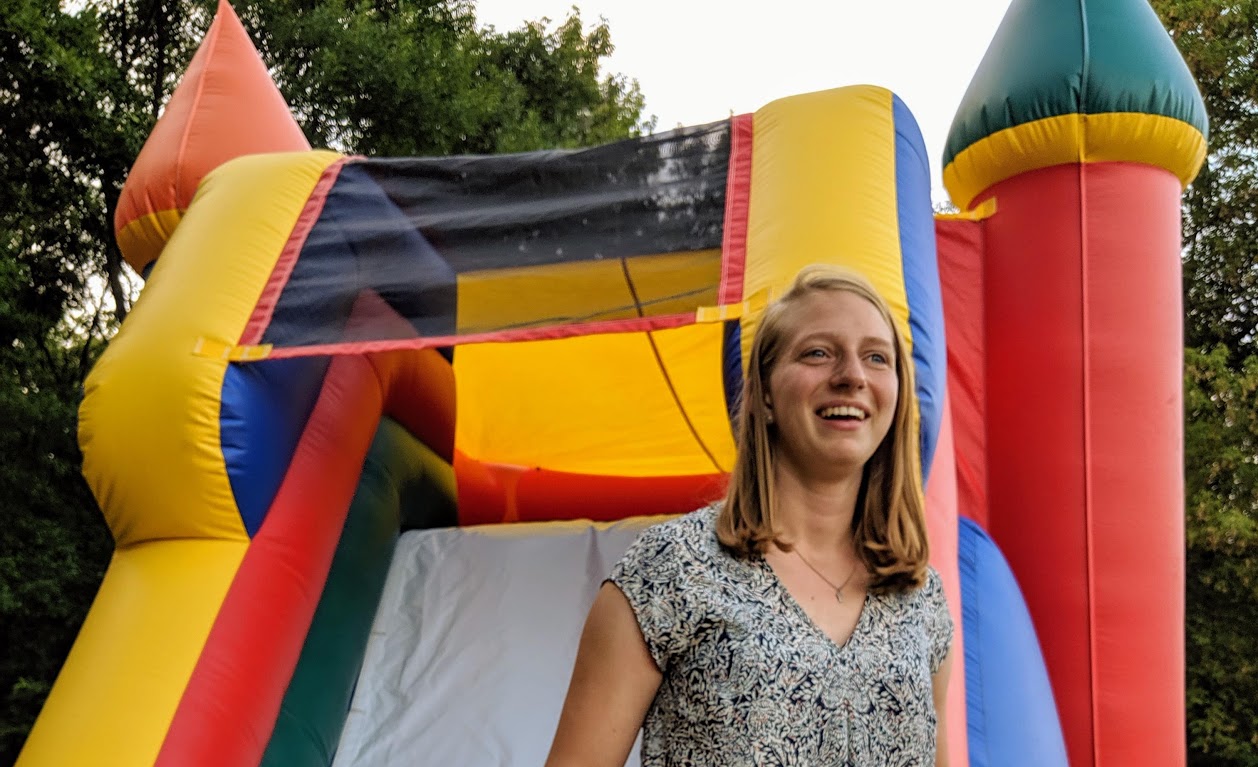I got engaged and pregnant on the same day.
Even better, it was “Buck Night” at the local ball park, so I also got to drink eleventy dollars of watery beer on a humid July evening while feigning interest in an All-American sport.
You might be trying to forge a connection between all that cheap beer and my getting knocked up. Damn your clever mind. Does it never rest?
Suffice it to say, though, pretty much all of my days since then have been anticlimactic. There were thousands of days of “go to work, read to the kids, sweat through a run, fold some laundry” and ever-so-rarely have there been “get engaged, drink beer, get pregnant” kinds of days. I suppose, though, that a girl can only have so many splendid Whopper Days; otherwise, I’d have a whole lot of husbands, hangovers, and kids. And frankly, one or two of each is about all I can handle. Ask both my husbands. They’ll attest to my treating them with an air of benign neglect. Fortunately, they are a comfort to each other.
So, yes, from that sticky July day came good things. However, the growth and arrival of our Allegra weren’t as straightforward as her conception.
All I knew was that I was pregnant, and the hospital in our town would confirm that but would not have me see a doctor or midwife until the end of the first trimester. So I took some vitamins, ate a lot of Ben and Jerry’s, exercised, and dreamed an entire life for the child inside of me.
Until one night–the last night of that first trimester–when I got off the couch after watching some reality tv and went to the bathroom. After pulling down my shorts, I discovered the pregnant woman’s nightmare: blood. Lots of it. And when I sat down on the toilet, there was an explosion of more blood, along with many miscellaneous floating bits of tissue.
My brain reeled, of course, and all I could think was, “This can’t be good. I’m pregnant, so this should stop.” At the time, Byron and I weren’t yet married, and he lived almost six hours away. I called him; he lurched out the door and into his car; then I called my friend Virginia, and she was at my house in minutes.
We went to the emergency room, where I spent a long, long time with my feet in stirrups. I heard words like “she’s dilated” and “tissue in the cervix” and “no heartbeat.” Virginia stood by my side, crying quietly into a Kleenex. My own tears ran down my cheeks into my ears.
After some time, I was told that it looked as though I’d miscarried. But, they told me, I was young, so future pregnancy could happen. And, they told me, a miscarriage is Nature’s way of ending a non-viable pregnancy. It happened, they told me, all the time.
But here’s the thing: it hadn’t happened to me before, and so I was ill-equipped to handle the absolute, immediate grief of losing a life I had already planned. Sure, I’d heard of women having miscarriages, but no one had actually ever brought that experience alive for me; no one had shared their experience publicly–and if there’s one thing I do, it’s find ways to process the world by touching the experiences of others. Yet miscarriage proved to be one of those last female taboos, one of the hidden subjects that no one acknowledged. So all I really knew was that I was in significant physical pain and even more profound emotional pain.
When, at 4 a.m., Byron finally got to me, we cried. And the next day, and the day after that, we cried. A baby isn’t real to the world until it’s born, but it had become real to us from the minute that stick turned pink. Even more, the promise of a life we’d made together confirmed our rightness of being.
Some days later, we went to see the midwife at the hospital, to have her check my uterus to see if all the tissue had been expelled that night in the emergency room, or if I’d need to undergo a D & C, to “clean things up.”
As I lay there, again on a table, she palpated my uterus, noting, “There’s still a fair amount of tissue in here. If you don’t mind, I’m going to roll over the mobile ultrasound machine to see how much we’re dealing with.”
I didn’t want to see the remains of the babe, so I stared at the wall as she worked, not registering her words of, “Hmmm. I see a heartbeat here.”
How cruel, I thought. Why is she taunting me?
But. Then. It. Sunk. In. A heartbeat?
My head whipped to look at the monitor, where I saw a most-contented-looking little figure reclining in the tub of my belly, a strong and regular heartbeat emanating from its chest.
My memory of the next few minutes is the feeling of Byron’s tears hitting my face as he stood above me and the midwife exiting the room, saying, “I’m just going to give you guys a few minutes.”
So my grief had prayed for a miracle–for the miscarriage not to have been real, for that pregnancy to still be happening. Suddenly, it was. Gradually, we pieced together that I had been carrying twins, and one of them had not made it. This, according to one nurse, happens more frequently than we know, but it is still a “once in a blue moon” event.
For the rest of my pregnancy, we called the kid inside of me The Little Gripper; I pictured it hanging resolutely onto the walls of my uterus by its tiny, soft fingernails while its twin fell out of me. Assuredly, I will never stop missing The Kid Who Fell, but mostly I can only marvel at the child who hung in there.

Today, March 31st, it has been twenty years since The Little Gripper became our Allegra, twenty years during which she has emerged as reserved, confident, smart, sweet, wry, amiable to a fault, Love Incarnate.
As the years tick by, I love her purity of character above all else.
Even when she was six, a wee first grader, her unalloyed caliber was evident. One night, at bedtime, her overtired brother, Paco, cried in his bed, sobbing: “I don’t want to go to sleep, ever. I wake up in the night, and I am alone. I’m always alone. I’m never going to close my eyes because sleep is too lonely.”
We had already pushed the kids’ beds next to each other, strung the room with lights, played music on a CD player through the night, and tried everything to get him to appreciate sleep as an opportunity, not a burden. But no matter what I suggested that night, he cried even harder.
Then an almost-seven-year-old hand snaked its way across his bed and extended itself onto his torso. With all the compassion of two souls, Allegra said, “Here, buddy. Just hold my hand while we fall asleep. And when you’re asleep, I’ll just keep holding on to you. You know I won’t ever leave you all alone.”
Happy birthday, Toots. Every single day for the past twenty years, I have thanked the sky above for that blue moon.



Leave a Reply